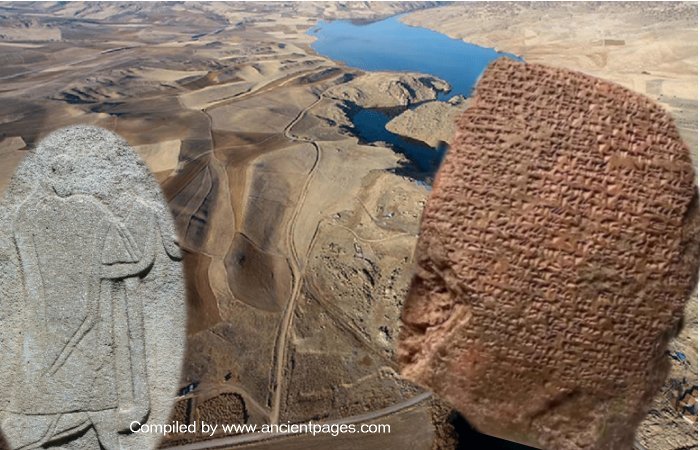Conny Waters – MessageToEagle.com – A 3,300-year-old Hittite cuneiform tablet found in Büklükale, Turkey, has finally been deciphered and sheds new light on the ancient Hittite civilization.
The tablet is inscribed with 70 lines of text. The form of the cuneiform characters suggests that it originates from the Hittite kingdom, dating back to the 14th century B.C.
Aerial view of of Büklükale. Credit: Kimiyoshi Matsumura
The ancient city of Büklükale, located about 100 kilometers from the capital, Ankara, was a large and important Hittite city.
The Hittites, an ancient civilization that once held significant power in the region of Anatolia, have long captivated the interest of archaeologists and historians. However, uncovering factual information about this extinct culture has proven challenging.
Led by Matsumura Kimiyoshi of the Japanese Institute of Anatolian Archaeology, which is a part of the Middle Eastern Culture Center in Japan, a dedicated archaeology team has devoted 15 years to uncovering the secrets buried within the ruins of the ancient city Büklükale.
The Hittites, known for using clay tablets, recorded state treaties, decrees, prayers, myths, and summoning rituals. Recognized as the earliest Indo-Germanic language, the Hittite language remained a mystery until researchers successfully deciphered it approximately a century ago.
Upon successfully translating the 3,300-year-old Hittite cuneiform tablet Kimiyoshi and his team discovered last year, researchers learned that Büklükale was a royal palace. This suggests it may have been equivalent in status to the royal residence in the Hittite capital, Hattusa.
The ancient clay tablet also contains information about enemies of the Hittite Empire.
This 3,300-year-old Hittite cuneiform tablet has now been deciphered. Credit: Kimiyoshi Matsumura, Japanese Institute of Anatolian Archaeology
Mark Weeden, an Associate Professor of Ancient Middle Eastern Languages at University College London, has translated the cuneiform text on the tablet. The initial six lines are in Hittite language and indicate that “four cities, including the capital, Hattusa, are in disaster.” The subsequent 64 lines consist of a prayer in the Hurrian language seeking victory.
Previously, tablets inscribed with the Hurrian language were exclusively discovered in the remnants of significant ancient cities closely associated with royal families, like Hattusa. The recent discovery of such a tablet suggests that Büklükale was one of these influential cities.
Hurrian, once the language of the Mitanni kingdom that later fell under Hittite control, remains a bit of a mystery. Despite its historical significance, it is not well understood. Scholars have spent several months trying to decipher the ancient inscription.
Historical records suggest that this tablet was created during a political marriage between the king of Hittite and a princess from one of these eastern kingdoms.
It is widely believed that following this union, the Hittites adopted the religion of their new allies and incorporated Hurrian into their religious ceremonies.
Hittite carvings at Hattusa. Credit: Adobe Stock – William Richardson
According to Yamamoto Hajime, an expert on the Hittite kingdom at Yamaguchi University, the Hittite Empire was in conflict with a western neighboring nation at the time. Concurrently, Egyptian diplomatic records indicate that the pharaoh arranged a political alliance through marriage with a woman from this rival country. The tablet reveals the name of the enemy nation’s king, suggesting that the city might have been under siege due to its geographical position at the farthest western point of Hittite territory.
Yamamoto also says that the Hittite kingdom subsequently emerged as a significant regional force. Therefore, he anticipates that future discoveries from the site may show how this achievement was accomplished.
Written by Conny Waters – MessageToEagle.com – AncientPages.com Staff Writer
Expand for references
Ellen Lloyd – The Hittites – Rise And Fall Of An Ancient Powerful Empire – AncientPages.com
Kimiyoshi Matsumura – Büklükale – JIAA
NK World Japan – Japanese archaeologists unearth pristine ancient tablet in Turkey

